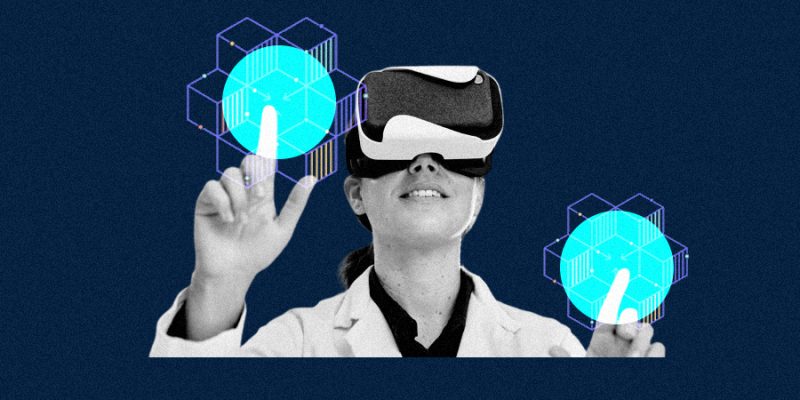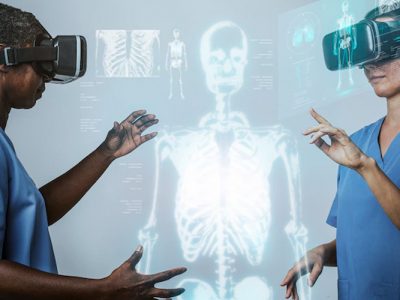
From Smart devices and Wearable tech to VR devices, Healthtech trends 2023 that are worth watching
The world of technology is constantly evolving, and 2023 is shaping up to be a particularly exciting year for wearables. From smartwatches and fitness trackers to virtual reality devices and fashion-forward designs, the future of wearable tech looks bright. In this article, we’ll take a look at some of the key trends to watch for in the world of wearable tech in 2023, including smarter devices with improved health monitoring capabilities, a greater focus on healthcare applications, and more sophisticated virtual reality options. Wearable tech is already making a big impact in our daily lives, and it looks like this trend is only going to continue in the coming years. Here are the healthtech trends 2023 for everyone to watch.
Smarter Wearables: The Future of Technology is on Your Wrist
Wearable tech has come a long way in recent years, and it looks like the future is bright for this innovative industry. Smartwatches and fitness trackers are just the beginning, as more and more companies are developing wearable devices that can do everything from monitoring your health to making payments. Here’s a closer look at what’s in store for the world of smarter wearables:
- Improved health monitoring: Wearable tech devices are already being used to track physical activity, sleep patterns, and other health-related metrics. But in the near future, we can expect to see even more advanced capabilities, such as real-time monitoring of vital signs like blood pressure and heart rate. This will allow people to track their health more closely and get help if necessary.
- More sophisticated software: One of the biggest trends in wearable tech is the development of more sophisticated software that can analyze data and provide personalized recommendations. For example, a smartwatch might be able to analyze your sleep patterns and suggest ways to improve the quality of your rest. Or a fitness tracker might be able to identify patterns in your workouts and offer suggestions for more effective training.
- Longer battery life: One of the biggest complaints about wearable tech is their short battery life. But as technology improves, we can expect to see devices with longer-lasting batteries that can go for days or even weeks on a single charge. This will make it easier to use these devices on a daily basis without having to worry about constantly recharging them.
- More integration with other devices: One of the most exciting things about wearable tech is the way it can integrate with other devices and platforms. For example, a smartwatch might be able to connect to your phone to receive notifications, or it might be able to control your home’s smart appliances. As wearables become more sophisticated, we can expect to see even more integration with other devices and platforms.
Wearable Healthcare: The Future of Medicine is on Your Wrist
Wearable technology has come a long way in recent years, and it looks like the future of healthcare is going to be heavily influenced by this innovative industry. From fitness trackers that monitor your physical activity to smartwatches that can detect early signs of illness, wearable devices are starting to play a major role in the way we take care of ourselves. Here’s a closer look at what’s in store for wearable healthcare:
Real-time monitoring of vital signs: One of the most exciting developments in wearable healthcare is the ability to monitor vital signs like heart rate and blood pressure in real time. This allows people to track their health more closely and get help if necessary. For example, if a wearable device detects an irregular heart rate, it might be able to alert the wearer and even send a notification to a healthcare provider.
Personalized healthcare recommendations: Wearable devices are getting smarter, and that includes their ability to analyze data and provide personalized recommendations. For example, a fitness tracker might be able to identify patterns in your workouts and suggest ways to improve your training. Or a smartwatch might be able to analyze your sleep patterns and suggest ways to improve the quality of your rest.
Remote patient monitoring: Wearable healthcare is also making it possible for people to be monitored remotely, which can be especially helpful for those with chronic conditions or who live in rural areas. For example, a patient with diabetes might wear a device that continuously monitors their blood sugar levels and sends the data to a healthcare provider, who can then adjust the patient’s treatment plan as needed.
Early detection of illness: Some wearable devices are starting to incorporate technology that can detect early signs of illness. For example, a smartwatch might be able to detect a fever or a change in heart rate that could be an indication of an impending illness. By detecting these signs early, people can take steps to prevent the illness from becoming more serious.



















